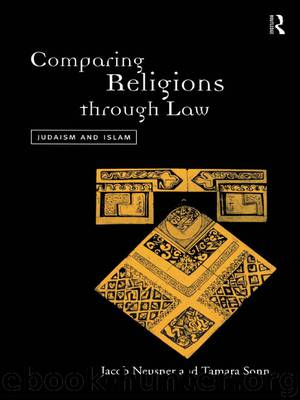Comparing Religions Through Law by Neusner Jacob; Sonn Tamara;

Author:Neusner, Jacob; Sonn, Tamara; [JACOB NEUSNER AND TAMARA SONN]
Language: eng
Format: epub
Publisher: Routledge
Published: 2011-08-26T16:00:00+00:00
D Conclusions
In both Judaic and Islamic classical legal theory, political authority rests on the delegation by God to humanity of the task of creating a just and therefore holy society. There are important differences, however, in how that authority is conceived. In Judaic law, God’s role is incorporated into a coherent system of justice that includes as well the religious and political institutions, and both social and psychological pressure imposed by the community. That coherent system of justice, just as in the case of Islam, defies the division of concerns into the eternal and secular; the one is meaningless without the other. It is not articulated as such in documents dealing with specific law or political theory. Yet a comprehensive reading of the oral Torah, the Mishnah, reveals a cohesive system of justice designed to restore the ideal relationship between God and humanity represented in the scriptural description of Eden.
The Islamic legal system is likewise a coherent system of justice based on revelation. Its components are clearly articulated in written documents, which envision authority as derived from or delegated by God to humanity. Unlike the Judaic system, God remains outside the system; God is its fons et origo, but is neither subject to it nor a participant in it. The very purpose of human existence is to do the will of God. On that the Torah of Judaism concurs. The legal system and its courts are components in the effort to meet that challenge. It is believed that the justice and mercy institutionalized in that system reflect the nature of God, and the guidance in that effort provided by revelation is a gift of God, but the challenge itself must be met by human beings.
As in Judaic law, in the world-view of Islamic law, the courts are only a part of the overall system. But unlike the Judaic system, the other components of the Islamic system include political power which is beyond its authority to control. The Judaic system does not contemplate political institutions beyond the ken of the Torah, probably because the Judaic system set forth in the Mishnah and amplified in the Talmud deals with the theory of matters, but much less with practicalities.
Perhaps the most significant difference between the Judaic and Islamic court system, however, lies in their respective views of the ultimate goal of legislation. In the Judaic system, as we saw above, the overall goal is to bring humanity back to its original, perfect relationship with the Creator. In the Islamic system, by contrast, the goal is to achieve what has never been achieved before, the challenge set out for humanity at creation. That challenge is to re-create in society the equality which all humanity shares in the eyes of the Creator. But in the Judaic vision, that was once achieved. The court system, with its cosmic world-view, is a vestige of that perfect relationship. In the Islamic system the challenge has yet to be met. The court system is among the means which human beings have established in an effort to do so.
Download
This site does not store any files on its server. We only index and link to content provided by other sites. Please contact the content providers to delete copyright contents if any and email us, we'll remove relevant links or contents immediately.
| Africa | Americas |
| Arctic & Antarctica | Asia |
| Australia & Oceania | Europe |
| Middle East | Russia |
| United States | World |
| Ancient Civilizations | Military |
| Historical Study & Educational Resources |
Cecilia; Or, Memoirs of an Heiress — Volume 1 by Fanny Burney(32075)
Cecilia; Or, Memoirs of an Heiress — Volume 3 by Fanny Burney(31469)
Cecilia; Or, Memoirs of an Heiress — Volume 2 by Fanny Burney(31419)
The Secret History by Donna Tartt(18213)
Sapiens: A Brief History of Humankind by Yuval Noah Harari(13995)
Leonardo da Vinci by Walter Isaacson(12812)
The Radium Girls by Kate Moore(11634)
Sapiens by Yuval Noah Harari(5126)
How Democracies Die by Steven Levitsky & Daniel Ziblatt(4967)
The Wind in My Hair by Masih Alinejad(4850)
Homo Deus: A Brief History of Tomorrow by Yuval Noah Harari(4694)
Endurance: Shackleton's Incredible Voyage by Alfred Lansing(4514)
Man's Search for Meaning by Viktor Frankl(4298)
The Silk Roads by Peter Frankopan(4275)
Millionaire: The Philanderer, Gambler, and Duelist Who Invented Modern Finance by Janet Gleeson(4113)
The Rape of Nanking by Iris Chang(4024)
Hitler in Los Angeles by Steven J. Ross(3803)
Joan of Arc by Mary Gordon(3792)
The Motorcycle Diaries by Ernesto Che Guevara(3790)
